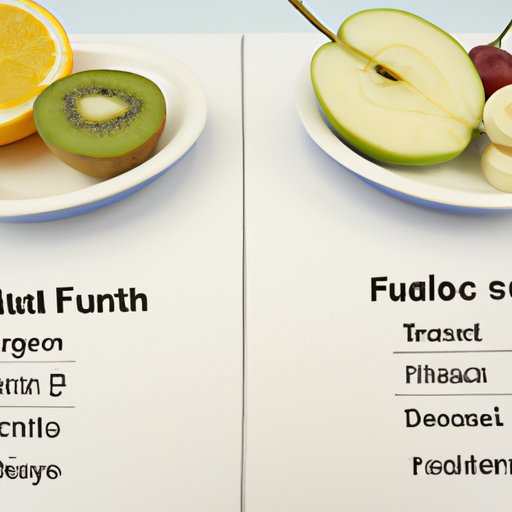Introduction
Fruit is an important part of any balanced diet, providing vital nutrients and energy for the body. But how healthy is fruit, really? In this article, we’ll explore the nutritional benefits and potential risks of eating fruit to help you decide if it’s the right food choice for you.
Definition of “Fruit”
First, let’s define what we mean by “fruit”. According to the United States Department of Agriculture (USDA), fruit is defined as “the edible reproductive body of a seed plant, having sweet flesh, consisting of one or more carpels surrounded by a pericarp”. This definition includes all fruits that are commonly eaten, including apples, oranges, bananas, grapes, strawberries, blueberries, and so on.
Overview of the Nutritional Benefits of Eating Fruits
Fruits provide a wide range of essential vitamins and minerals that are necessary for good health. They are also high in fiber, which helps to keep the digestive system running smoothly. Additionally, many fruits contain antioxidants that can help protect your body from free radical damage. All of these factors make fruits an excellent choice for adding to a healthy diet.

Exploring the Nutritional Benefits of Eating Fruits
Nutrient Content of Fruits
Fruits are an excellent source of many essential vitamins and minerals. For example, oranges are a great source of vitamin C, while bananas are a good source of potassium. Fruits are also a good source of dietary fiber, which helps to keep your digestive system running smoothly. Additionally, many fruits contain powerful antioxidants, such as flavonoids and polyphenols, which can help protect your body from free radical damage.
Health Benefits of Fruits
Eating fruits regularly has been linked to numerous health benefits. A study published in the journal PLOS Medicine found that people who ate at least two servings of fruit per day had a lower risk of developing chronic diseases, such as heart disease and type 2 diabetes, compared to those who ate less than one serving per day. Additionally, a meta-analysis of 27 studies published in the journal Nutrition Reviews found that higher intakes of fruit were associated with a reduced risk of stroke.

Examining the Health Risks of Consuming Too Much Fruit
Overconsumption of Fruits
While eating fruits can be beneficial for your health, it’s important to remember that too much of anything can be unhealthy. Eating large amounts of fruit can lead to overeating and an excessive intake of sugar, both of which can have negative health consequences. Additionally, some people may experience digestive issues, such as bloating and gas, when they eat large amounts of fruit.
Potential Health Risks of Overconsuming Fruits
When consumed in excess, fruits can lead to a number of health problems. Excessive intake of sugar can cause weight gain, increased cholesterol levels, and an increased risk of type 2 diabetes. Additionally, overconsumption of certain types of fruit can lead to an imbalance of electrolytes, which can result in dehydration and fatigue. Finally, eating large amounts of fruit can interfere with the absorption of other nutrients, such as iron and calcium.

Comparing Fruits to Other Foods: A Nutritional Comparison
Calories and Macronutrients in Fruits Compared to Other Foods
Fruits contain fewer calories and less fat and protein than other foods, such as grains and meats. For example, one cup of cooked brown rice contains 216 calories, 4 grams of fat, and 8 grams of protein, while one cup of diced mango contains just 99 calories, 0.7 grams of fat, and 1.4 grams of protein. However, it’s important to note that some fruits contain more calories and fat than others. For example, avocados are high in calories and fat, while berries are relatively low in calories and fat.
Vitamin and Mineral Content in Fruits Compared to Other Foods
Fruits are an excellent source of many essential vitamins and minerals, such as vitamin C, folate, and potassium. However, some fruits are better sources of certain vitamins and minerals than others. For example, oranges are a great source of vitamin C, while bananas are a good source of potassium. Additionally, many other foods, such as grains, dairy, and meat, also contain essential vitamins and minerals, so it’s important to include a variety of foods in your diet to ensure you’re getting enough of these important nutrients.
Creating a Healthy Diet Plan that Includes Fruits
Guidelines for Including Fruits in Your Diet
To get the most out of your diet, it’s important to include a variety of fruits in your meals. The USDA recommends eating at least two servings of fruit per day. It’s also important to choose a variety of fruits, as each type of fruit has its own unique nutrient profile. Additionally, it’s best to opt for fresh, whole fruits rather than processed or canned fruits, as they contain more nutrients and fewer added sugars.
Recommended Portions of Fruits for Different Goals
The amount of fruit you should eat depends on your individual goals. If you’re trying to lose weight, the USDA recommends limiting your intake to one to two servings of fruit per day. On the other hand, if you’re looking to gain weight, you may need to increase your intake to three to four servings per day. It’s important to speak to your doctor or a registered dietitian to determine the right amount of fruit for your individual needs.
Investigating the Potential Health Benefits of Different Types of Fruits
Unique Nutrient Profiles of Different Fruits
Each type of fruit has a unique nutrient profile, so it’s important to include a variety of different fruits in your diet. For example, oranges are a great source of vitamin C, while bananas are a good source of potassium. Additionally, some fruits, such as blueberries, are rich in antioxidants, while others, such as apples, are high in dietary fiber. By including a variety of different fruits in your diet, you can ensure you’re getting all the essential vitamins and minerals your body needs.
Potential Health Benefits of Specific Types of Fruits
In addition to providing essential vitamins and minerals, some fruits have been linked to specific health benefits. For example, a study published in the journal Nutrition Research found that eating blueberries may help reduce inflammation and improve blood sugar control. Additionally, a review published in the journal Advances in Nutrition found that eating apples may help reduce the risk of cardiovascular disease and certain cancers.
Conclusion
Summary of Key Points
In conclusion, eating fruit is an important part of a healthy diet. Fruits are a great source of essential vitamins and minerals, as well as dietary fiber and antioxidants. Eating fruits can help reduce the risk of chronic diseases, such as heart disease and type 2 diabetes. However, it’s important to remember that too much of anything can be unhealthy, so it’s best to limit your intake to two servings per day. Finally, it’s important to choose a variety of different fruits to ensure you’re getting all the essential nutrients your body needs.
Final Thoughts on the Health Benefits of Eating Fruits
Fruits are an incredibly nutritious and delicious food that can be enjoyed as part of a balanced diet. Eating a variety of different fruits can provide essential vitamins and minerals, as well as dietary fiber and antioxidants. Additionally, regular consumption of fruits has been linked to a reduced risk of certain chronic diseases. So, if you’re looking to improve your health, adding more fruits to your diet is an excellent place to start.
(Note: Is this article not meeting your expectations? Do you have knowledge or insights to share? Unlock new opportunities and expand your reach by joining our authors team. Click Registration to join us and share your expertise with our readers.)
